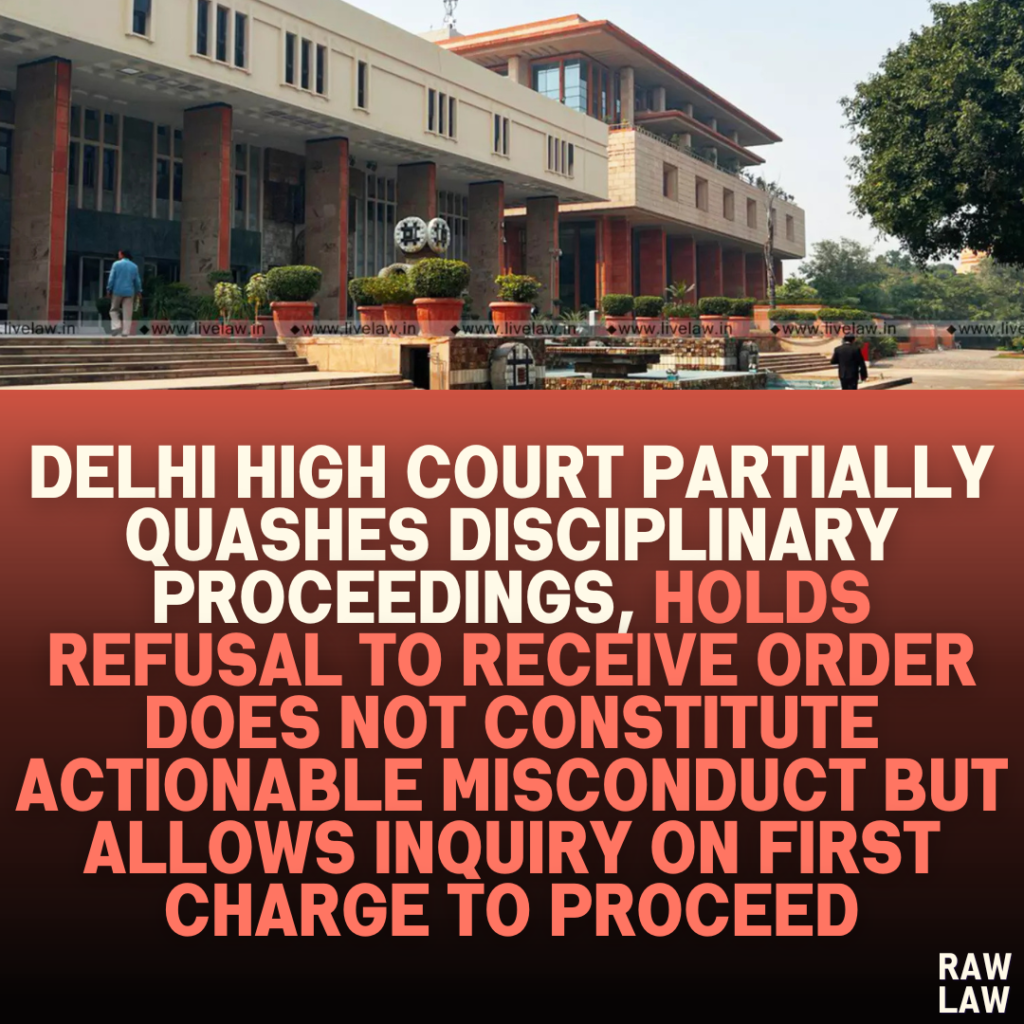Court’s Decision:
The Delhi High Court partially allowed the writ petition by quashing the disciplinary proceedings initiated against the petitioner under Article of Charge-II, which accused him of willful insubordination. The court found that this charge did not justify disciplinary action. However, the court allowed the inquiry to continue concerning Article of Charge-I, while reserving the petitioner’s right to seek remedies if the outcome of the inquiry is adverse to him.
Facts:
The petitioner filed a writ petition challenging the order of the Central Administrative Tribunal (CAT), which had dismissed his plea seeking to quash a charge sheet issued to him on 11 July 2019. The petitioner contended that the charges were baseless and motivated by malafides, as he had exposed wrongdoings within the office of the respondents. The charges pertained to forwarding a representation bypassing office channels and allegedly refusing to receive an official order.
Issues:
- Whether the charge of forwarding a representation bypassing official channels constituted misconduct.
- Whether the charge of willful insubordination for allegedly refusing to receive an official order justified disciplinary action.
Petitioner’s Arguments:
The petitioner argued that the charges against him did not amount to misconduct. He asserted that the charge sheet was issued out of malafides as he had attempted to expose irregularities. He further contended that refusing to receive an order could not be construed as willful insubordination.
Respondent’s Arguments:
The respondents contended that the disciplinary proceedings were justified, as the petitioner had violated office procedures and disobeyed official directives, thereby warranting action under the relevant service rules.
Analysis of the Law:
The court acknowledged the general principle that disciplinary proceedings should not be interfered with at the stage of the chargesheet. However, it emphasized that where an Article of Charge does not constitute actionable misconduct, the court is within its rights to intervene and quash the proceedings.
Precedent Analysis:
The court relied on the Supreme Court’s decisions in Union of India v. Kunisetty Satyanarayana and Ministry of Defence v. Prabhash Chandra Mirdha, where it was held that disciplinary proceedings could proceed unless the charges were manifestly baseless or legally untenable.
Court’s Reasoning:
The court observed that the second charge of willful insubordination was inherently contradictory and lacked a legitimate basis to proceed with disciplinary action. Even if the petitioner had refused to receive an order on one occasion, this could not be construed as willful insubordination that warranted disciplinary proceedings. Consequently, the court quashed the proceedings related to this charge. However, the court did not express an opinion on the first charge and allowed the inquiry to proceed.
Conclusion:
The court quashed the disciplinary proceedings concerning the charge of willful insubordination but allowed the inquiry into the first charge to continue. It also reserved the petitioner’s right to challenge any adverse decision arising from the ongoing inquiry.
Implications:
The ruling underscores the court’s willingness to intervene in disciplinary proceedings where the charges lack a legitimate basis. It reinforces the principle that not every procedural violation warrants disciplinary action, especially when the facts do not justify such a measure.




Pingback: Chhattisgarh High Court Upholds Trial Court’s Rejection of Preliminary Limitation Issue – “Evidence Must Be Evaluated to Determine If Suit is Time-Barred” - Raw Law
Pingback: Chhattisgarh High Court Affirms CAT's Decision: Railway Authorities Violated Recruitment Rules, Ordered to Recast ALP Shortlist Without Changing Categories in 90 Days - Raw Law
Pingback: Supreme Court Strikes Down Vague 'Decent Behavior' Condition in Remission Order, Clarifies Grounds and Due Process for Revocation - Raw Law